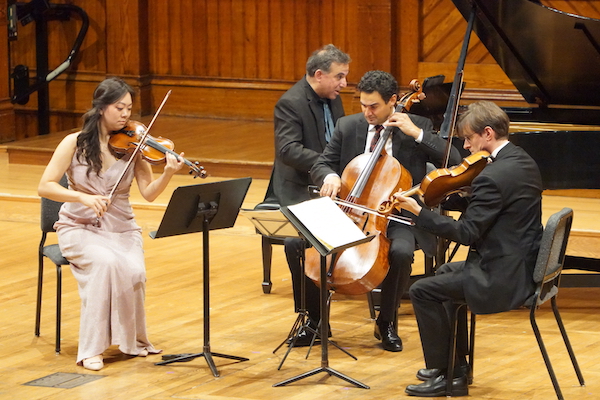Concert Review: Boston Chamber Music Society’s Season Opener — Savoring a Hidden Gem
By Aaron Keebaugh
Performances of such zest and sensitivity deserve to be rewarded with rapt enthusiasm, even love.

Boston Chamber Music Society in action at Sanders Theatre. Photo: Wen Huang
Felix Mendelssohn rarely left a score unfinished. And if he abandoned a piece, it was usually for good reason.
But in the case of his String Quintet No. 2 in B-flat, elegy and tragedy fuse together in such unexpected ways that make one reconsider — if momentarily — his choice not to publish the piece in his lifetime.
A single passage encapsulates this dilemma: the Adagio finds the lower strings underscoring a solo violin arpeggio that twists and coils its way to resolution. Distant and even haunting, the music wrestles between ethereal calm and existential striving — like a faint voice calling out from the calm.
Who knows what the composer thought about this stretch of music? But a performance given by the Boston Chamber Music Society at Sanders Theatre this past weekend shed new light on moments of hidden tension. As is often true with this superb group of chamber music advocates, who opened their season on Sunday, the fruits of discovery go well beyond the notes on the page.
Composed in 1845 but published posthumously, the String Quintet No. 2 has never enthralled listeners and critics as his considerably more famous Octet and Piano Trios have. Mendelssohn himself was unhappy with the finale, which he wrote off as “overtaxed” rather than apt — it failed to bring the other movements to firm resolution.
Yet Sunday’s reading, led by guest violinist David Bowlin, revealed the brilliance of the piece’s orchestral-like textures, its almost operatic lyricism and gradual build to every climactic point. Here was a reading of a hidden gem by a beloved composer to savor.
The musicians wrung a strum und drang gravitas from the opening Allegro vivace. The Scherzo made for a breezy departure, here sounding like a limpid, almost ersatz waltz. And the finale, despite its brevity, packed intensity in every passing bar. Through it all, the ensemble struck a sumptuous blend, the dusky weight of the violas and cello anchoring the violin melodies, which broke free in all the right places.
The concert opened with Mozart’s Piano Quartet No. 2 in E-flat major, a score that scaled back the dark energy the composer had poured into his previous work in the genre.
But while the Second Quartet seesaws between delicacy and wit, the music broods quietly in certain passages. This music detours through that darkness as it dances through the light.
The BCMS musicians made the opening Allegro unfold with svelte grace. Throughout, pianist Max Levinson proved the consummate Mozartean, his tone crisp and pinging where appropriate. Violinist Alyssa Wang, violist Dimitri Murrath, and cellist Raman Ramakrishnan wove a soft bed of sound in support.
The Larghetto also flowed between poise and peaceful assurance, the lines rising, coiling into soft arcs, and falling away like breath. There was plenty of momentum as well: the final Allegretto romped straight to the concluding phrases.
Antonin Dvorak’s Piano Quintet No. 2, Op. 81, which came after intermission, set the scene for an even more diametric display of solace and turbulence. Composed while Dvorak was looking to rework his earlier First Piano Quintet — which he had destroyed after its unsatisfactory premiere — the Second’s fusion of soulful charm and earthy vitality erupts in its opening minutes. After cellist Raman Ramakrishnan spun a searching melody to open the Allegro, the rest of the ensemble tore through the ensuing lines with rapt fury. This was music of the moment, with Max Levinson’s warm piano chords providing welcome, if fleeting, stability.
The quick passages of the “Dumka” lilted with the bravura of a village band. So did the Scherzo, where sweeping energy erupted in the robust Finale.
Applause for these musicians broke out before the final chord had time to fade. The gesture spoke clearly: for the Boston Chamber Music Society, performances of such zest and sensitivity deserve to be rewarded with rapt enthusiasm, even love.
Aaron Keebaugh has been a classical music critic in Boston since 2012. His work has been featured in the Musical Times, Corymbus, Boston Classical Review, Early Music America, and BBC Radio 3. A musicologist, he teaches at North Shore Community College in both Danvers and Lynn.
